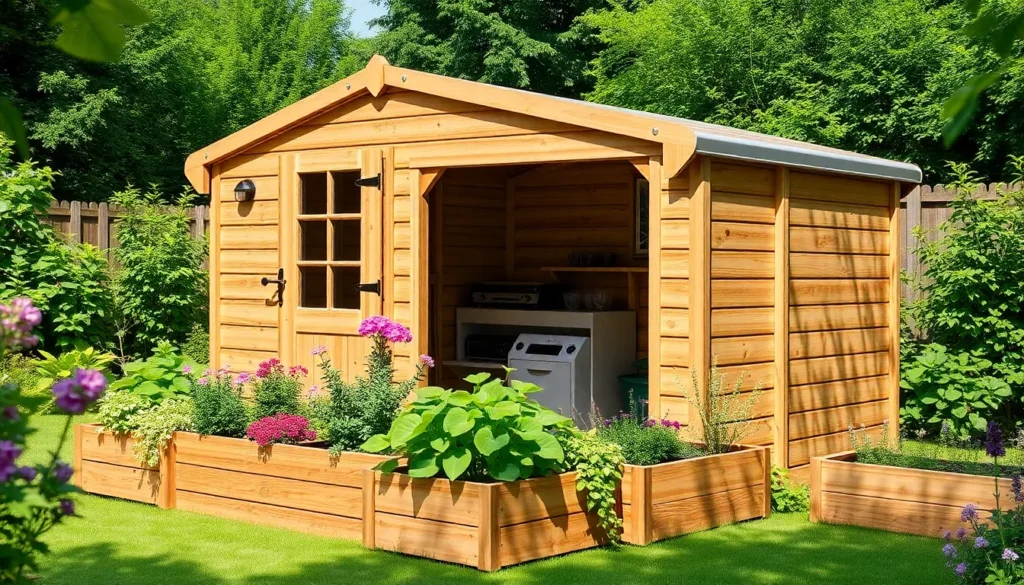In a world where plastic seems to multiply faster than rabbits and climate change is knocking at our door with a sledgehammer, sustainable living isn’t just a trendy buzzword—it’s a necessity. Imagine a life where you’re not just surviving, but thriving while giving Mother Earth a high-five. By embracing sustainable practices, individuals can help reduce waste, conserve resources, and ensure future generations inherit a planet that’s still got some pizzazz.
Table of Contents
ToggleUnderstanding Sustainable Living
Sustainable living involves making choices that reduce an individual’s environmental impact. This approach promotes a balanced relationship with the planet.
Definition of Sustainable Living
Sustainable living refers to lifestyle choices aimed at maintaining Earth’s ecosystems and resources. This includes reducing waste, using renewable energy, and conserving water. Developing sustainable habits can help mitigate climate change and preserve biodiversity. Prioritizing long-lasting resources allows for a healthier planet now and in the future. Examples include choosing local produce and reducing energy consumption. Awareness of one’s ecological footprint encourages better decision-making for individuals and communities.
Key Principles of Sustainability
Sustainability is founded on key principles that guide environmental responsibility. Reducing waste focuses on minimizing consumption and promoting recycling. Conservation of resources emphasizes using only what is necessary. Communities benefit from using renewable resources such as solar and wind energy. Community engagement enhances collective efforts to promote a sustainable future. Local economies thrive when individuals choose to support sustainable practices. Implementing these principles collectively fosters overall environmental health and resource availability.
Environmental Impact

Sustainable living significantly impacts the environment by addressing critical issues like climate change and resource depletion. Individuals adopting eco-friendly practices contribute to making the planet healthier and more resilient.
Reducing Carbon Footprint
Reducing carbon emissions plays a vital role in slowing global warming. Individuals can lower their carbon footprint through choices like using public transportation, biking, or driving fuel-efficient vehicles. Switching to renewable energy sources, such as solar or wind power, actively decreases reliance on fossil fuels. Simple actions, like using energy-efficient appliances, also minimize energy consumption, directly affecting greenhouse gas emissions. Each person’s efforts collectively lead to substantial reductions in harmful emissions, ensuring a cleaner atmosphere.
Preserving Natural Resources
Preserving natural resources ensures future generations access essential materials like water and fossil fuels. Sustainable living encourages practices like recycling and reusing products, which reduce the demand for new raw materials. Additionally, conserving water through mindful usage, such as fixing leaks and adopting drought-resistant landscaping, secures this precious resource. Supporting local agriculture fosters sustainable farming methods, which protect soil and promote biodiversity. By prioritizing resource preservation, individuals contribute to healthier ecosystems and promote long-term environmental stability.
Economic Benefits
Sustainable living offers a range of economic benefits that strengthen individual households and larger communities.
Cost Savings from Sustainable Practices
Reduced utility bills emerge as individuals conserve energy and water through sustainable practices. Switching to energy-efficient appliances often results in lower electricity costs over time. Many homeowners save money by utilizing reusable products instead of disposable ones. Communities that prioritize sustainability frequently experience reduced waste management expenses. Eco-friendly transportation options, like public transit and biking, also lead to significant savings. By investing in renewable energy sources, such as solar panels, households can eliminate reliance on fossil fuels while decreasing long-term energy costs.
Job Creation in Green Industries
Growth in green industries significantly boosts local and national economies. Renewable energy sectors, including solar and wind, consistently create new job opportunities as technology advances. Professionals skilled in eco-friendly practices find extensive employment options in sustainable agriculture, eco-tourism, and construction. Training programs focused on green technologies increase workforce readiness, enhancing community resilience. Economies that emphasize sustainability often attract investments and innovation, fostering a cycle of continuous development. These sectors not only provide job growth but also contribute to healthier environments and community well-being.
Social Importance
Sustainable living plays a vital role in fostering social well-being. Advocates of sustainable practices promote community coherence and a shared sense of responsibility for the environment.
Enhancing Community Resilience
Sustainable initiatives strengthen community resilience by creating networks that encourage collaboration. Local food systems provide fresh produce while supporting nearby farmers. Communities prioritizing renewable energy reduce dependency on external sources, enhancing stability during crises. This interconnectedness fosters social ties, ultimately making communities better equipped to face challenges.
Promoting Health and Well-being
Improved health and well-being emerge from sustainable living practices. Access to clean air and water decreases health risks associated with pollution. Engaging in activities like urban gardening promotes physical activity, leading to better fitness levels. Communities that emphasize sustainable transportation options reduce traffic-related injuries and improve air quality. Higher quality of life results from these investments in health-focused initiatives.
Global Perspectives
Global support for sustainable living has grown. Various regions showcase commitment through numerous successful initiatives.
Case Studies of Successful Sustainable Living
Several urban areas across the globe serve as examples of effective sustainable living practices. In San Francisco, California, a zero waste program diverted over 80% of waste from landfills. Barcelona, Spain, implemented a green city initiative, increasing green spaces and promoting biking, which decreased vehicle emissions by 30%. Similarly, Copenhagen, Denmark, targets becoming carbon neutral by 2025, driven by extensive investments in wind energy. These examples highlight how cities can implement sustainable practices, achieving significant environmental benefits while enhancing the quality of life for their residents.
International Efforts and Agreements
International collaboration is critical in promoting sustainable living. The Paris Agreement, ratified by 196 countries, aims to limit global warming to below 2 degrees Celsius, ushering in climate action initiatives worldwide. Similarly, the United Nations’ 2030 Agenda for Sustainable Development includes 17 Sustainable Development Goals that encourage nations to pursue equitable and sustainable practices. These agreements emphasize global interdependence and a shared responsibility to combat climate change. Countries participating in these initiatives have witnessed substantial progress in environmental health, resource conservation, and economic stability.
Embracing sustainable living is crucial for ensuring a healthier planet and a brighter future. By making conscious choices that prioritize environmental health individuals can contribute to a more stable ecosystem and a thriving community. These actions not only reduce waste and conserve resources but also enhance economic resilience and social cohesion.
As communities come together to adopt sustainable practices the benefits ripple outwards. Healthier environments lead to improved quality of life while fostering a sense of shared responsibility. With a growing global movement toward sustainability it’s clear that every effort counts. The path to a sustainable future begins with individual actions that collectively create lasting change.










